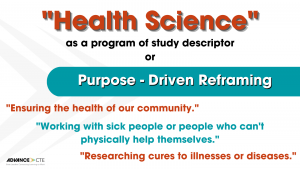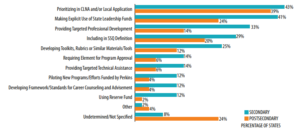Beginning a career has always been a daunting proposition for young people. With the coronavirus pandemic causing rapid disruption in the world of education and work, an acceleration of changing workplace trends and 46 million employees quitting their jobs in 2022, the world of work seems more daunting than ever. When taking into account the economic, social and environmental changes, the interests and needs of learners are evolving in new and fascinating ways. While employers are searching for ways to retain dedicated talent, employees are searching for ways to contribute to the society they live in and find purpose-driven work.
Over the past year, Advance CTE sought to connect this gap between the purpose-driven employee and the retention-minded employer through a reframing of career pathway descriptors, exploring whether a Career Technical Education (CTE) program oriented around one’s contribution to their community would prepare learners to be passionate and excited about future work while providing employers with a strong and motivated talent pipeline.
In Contribution to Society: Exploring Purpose-Driven Framing for Career Pathways, we build the case for this type of framing through research, demonstrating that learners want to talk about their future contributions, but don’t always have the language or the appropriate outlet to do so. Research into occupational identity and social capital similarly reveals that these types of contribution-centered conversations can provide learners with the opportunity to learn about a broad set of careers that could fulfill their professional goals while building the networks they need to be successful.
To further explore this framing, we commissioned focus groups with learners of different learner levels and conducted in-depth interviews with hiring professionals across six different industries. Through this research, we explored a number of trends:
- Framing career pathways and programs of study around a contribution to society has value, but language must be framed appropriately.
- Titles and descriptions of programs of study or industry sectors alone are insufficient for effective advising and recruitment.
- The most effective framing of a program of study — for both learners and employers — links a learner’s contribution to society to their career goals.
- Employers see value in CTE programs, particularly in creating passionate and committed employees.

In this white paper, we also share potential implications about the value of a “contribution to society” centered frame for CTE programs, including implications for learners, for instructors and counseling professionals, for administrators and policymakers, and for employers. The white paper also explores directions of future research and work to help validate and implement conversations around a purpose-driven framing for CTE programs.
CTE programs build the technical and academic knowledge and skills learners need to be successful in the career of their choosing; as learners continue to strive toward a purposeful future, this type of framing could be an effective tool in helping learners navigate their own career journey in a more informed and purpose-driven way. Advance CTE will be launching work later this year to further explore how to elevate and implement a “contribution to society” centered frame in CTE programs and policies. Stay tuned to learn more!
Dan Hinderliter, Senior Policy Associate


 Additionally, 80 percent of families participating in CTE are satisfied with opportunities to jumpstart their postsecondary education in high school through opportunities to earn college credit and take advanced classes compared to just 60 percent of families not participating in CTE.
Additionally, 80 percent of families participating in CTE are satisfied with opportunities to jumpstart their postsecondary education in high school through opportunities to earn college credit and take advanced classes compared to just 60 percent of families not participating in CTE.


